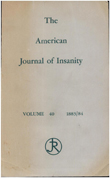Sleep disturbance and its relationship to psychiatric morbidity after Hurricane Andrew
Abstract
OBJECTIVE: Sleep disturbance is an important dimension of posttraumatic stress disorder (PTSD), but most of the limited available data were obtained years after the original traumatic event. This study provides information on sleep disturbance and its relationship to posttraumatic morbidity from evaluations done within a year after the trauma. METHOD: Sleep and psychiatric symptoms of 54 victims (12 men and 42 women) of Hurricane Andrew who had no psychiatric illness in the 6 months before the hurricane were evaluated. A subset of hurricane victims with active psychiatric morbidity (N = 10) and nine comparison subjects who were unaffected by the hurricane were examined in a sleep laboratory. RESULTS: A broad range of sleep-related complaints were rated as being greater after the hurricane, and psychiatric morbidity (which was most commonly PTSD, followed by depression) had a significant effect on most of the subjective sleep measures. In addition, subjects with active morbidity endorsed greater frequencies of "bad dreams" and general sleep disturbances before the hurricane. Polysomnographic results for the hurricane victims revealed a greater number of arousals and entries into stage 1 sleep. REM density correlated positively with both the PTSD symptom of reexperiencing trauma and global distress. CONCLUSIONS: Subjects affected by Hurricane Andrew reported sleep disturbances, particularly those subjects with psychiatric morbidity. Tendencies to experience bad dreams and interrupted sleep before a trauma appear to mark vulnerability to posttraumatic morbidity. Results of sleep laboratory evaluations suggested brief shifts toward higher arousal levels during sleep for PTSD subjects and a relationship of REM phasic activity and symptom severity.
Access content
To read the fulltext, please use one of the options below to sign in or purchase access.- Personal login
- Institutional Login
- Sign in via OpenAthens
- Register for access
-
Please login/register if you wish to pair your device and check access availability.
Not a subscriber?
PsychiatryOnline subscription options offer access to the DSM-5 library, books, journals, CME, and patient resources. This all-in-one virtual library provides psychiatrists and mental health professionals with key resources for diagnosis, treatment, research, and professional development.
Need more help? PsychiatryOnline Customer Service may be reached by emailing [email protected] or by calling 800-368-5777 (in the U.S.) or 703-907-7322 (outside the U.S.).



